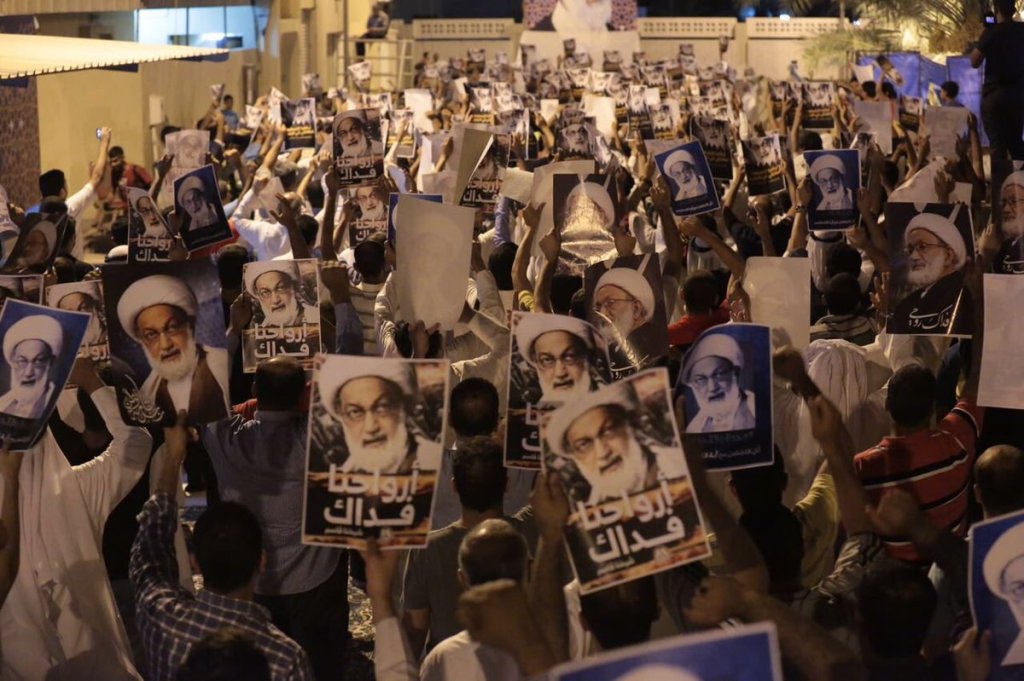27 July 2016 – The Bahraini government has intensified state restrictions on the right to freedom of religion for the country’s Shia majority. While the authorities have obstructed and prosecuted Shia religious practices, they have simultaneously escalated their use of repressive measures against the country’s religious clerics. The government has targeted Shia clerics with summons, arrests, and judicial harassment, and has rendered leading cleric Sheikh Isa Qassim stateless.
Bahrain’s High Criminal Court today held its first hearing in the trial of Sheikh Isa Qasim along with two other individuals. The court postponed the trial of the Shia spiritual leader to 14 August 2016.
The public prosecution charged Sheikh Qasim and the two others with allegedly receiving secret foreign funding, and “withdrawing, depositing, purchasing, allocating, and distributing the amounts in a way that shows that their sources are licit, contrary to the facts/ reality.” These charges are related to the Shia religious practice of Khums.
Khums, a major religious practice and obligation for those of the Shia faith, is an annual payment undertaken by Shia Muslims to Shia clerics, who then distribute the money to orphans, other vulnerable members of society, and projects to improve the community. The aim of Khums is to promote social solidarity and eliminate poverty. Sources have also indicated that many families of Bahrain’s prisoners of conscience are dependent upon this money. It is believed that the Bahraini government is charging Shia clerics with allegations of illegal fundraising due solely to their central role in this long-established religious practice.
In June 2016, the authorities closed down two of the remaining institutions of the Shia Muslim community in Bahrain, the Al-Risala Islamic Society and the Islamic Enlightenment Society (Al-Taweya), over allegations related to the practice of Khums.
On 16 July 2016, the Public Prosecution stated that “three cases related to raising funds illegally, money-laundering, and carrying out transactions to conceal their sources and make them appear legitimate will be reviewed by a court.” The government has charged nine individuals with these allegations, including Sheikh Qasim. If convicted, these individuals face up to seven years in prison and a fine of one million dinars (USD $2,650,000).
The authorities stripped Sheikh Qassim of his Bahraini nationality on 20 June 2016, triggering mass protests in Duraz. These demonstrations were met with further restrictions by the government. Since 20 June, the Bahrain Center for Human Rights (BCHR) has documented the summoning, interrogation, and arrests of at least 23 Shia clerics over charges related to their freedom of religion, expression, and assembly.
We, the undersigned, find that the prosecution of Sheikh Isa Qasim and other Shia clerics to be a discrimination against Shia Muslims in Bahrain and violative of their right to freedom of religion and belief. The charges in relation to Khums breaches Bahrain’s law of 1956 on collecting donations; as well as Article 22 of Bahraini constitution which states that “freedom of conscience is absolute. The State shall guarantee the inviolability of places of worship and the freedom to perform religious rights and to hold religious processions and meetings in accordance with the customs observed in the country.”
We, the undersigned, call on for the Government of Bahrain to:
- End immediately the persecution of Shia clerics for their religious activities;
- End restrictions on the rights to freedom of religion and expression; and
- Comply with all international human rights standards, particularly those concerning the freedom of religion and expression.
Signed:
Americans for Democracy & Human Rights in Bahrain
Bahrain Center for Human Rights
Bahrain Institute for Rights and Democracy
Justice Human Rights Organisation
European Center for Democracy and Human Rights




